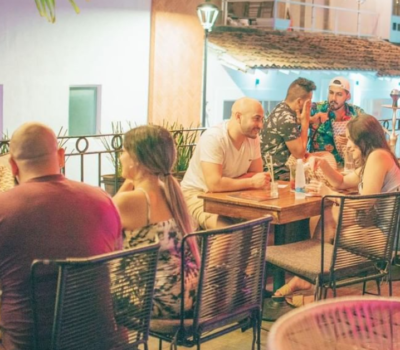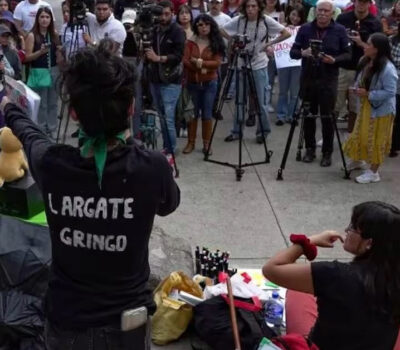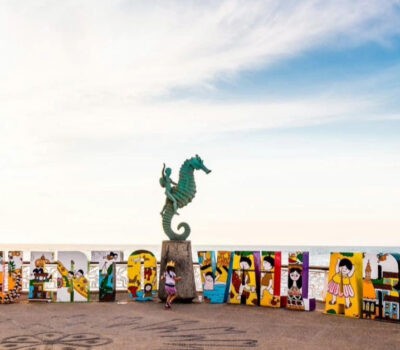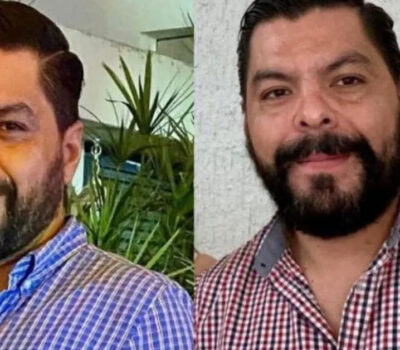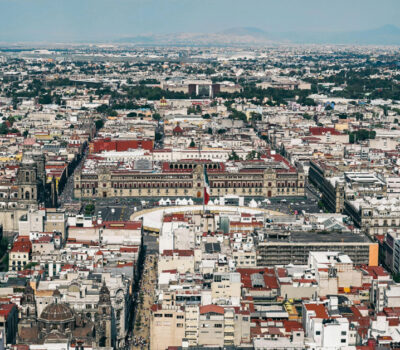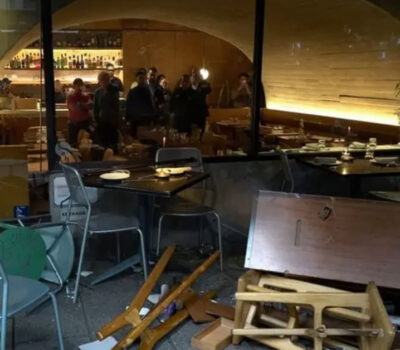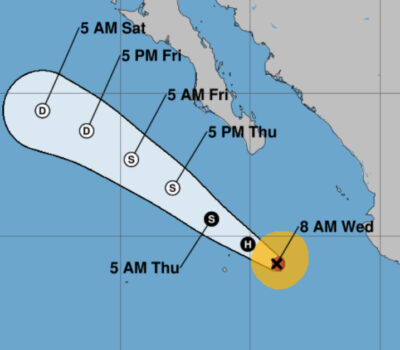Nestled between high-rise buildings on a busy street in Chile’s modern capital is a straw hut that’s a sign of growing respect for the Andean country’s long-disdained indigenous past.
Ailing patients, many referred by a hospital across the street, line up to see the Mapuche herbalist inside as part of a government initiative to incorporate pre-Hispanic knowledge into Chile’s public health system.
Mapuche culture, long looked down upon in Chile, is slowly becoming chic.
“I’m not Mapuche but I believe in their culture,” said Elba Soto, 56, who often comes to the ruka – a traditional Mapuche thatched home – looking for herbs and ointments to ease the pain in her bones. “And I love all of it.”
The geometrical designs of the Mapuche have made their way into fashion shows from New York to Paris, their food is inspiring high-end cuisine and popular singer Ana Tijoux waves the multicolored Mapuche flag during her concerts and raps about their struggle in her Grammy-nominated albums. Television stations even compete for ratings with shows about the country’s largest indigenous group.
“The Mapuche today are not just folklore. The Mapuche today are a cultural icon and a pop-cultural icon,” said Pedro Cayuqueo, a Mapuche author and host of “KulMapu,” a popular TV show profiling everything Mapuche that is broadcast on CNN Chile. “It makes people in rock, film and gastronomy become interested and stop looking at the Mapuche in a paternalistic way, but as something that’s cool.”
The Mapuche, a name that means “people of the land” in their original language, resisted invaders for centuries – first the mighty Incan empire, then the Spanish conquistadors who arrived five centuries ago in the area now known as Chile.
The Mapuche ultimately won treaties with the Chilean state recognizing their right to everything south of the Bio Bio river, or roughly the entire southern half of the long, thin country.
But in the late 19th century, a new wave of European settlers arrived, and the treaties were broken, with Mapuche lands seized in violent takeovers. The survivors were pushed to the fringes of settled lands.
Today, most of the more than 1 million Mapuche live in Santiago’s metropolitan area and in their ancestral home in south-central Araucania, the country’s poorest region.
As group, they are far poorer and less educated than other Chileans, more prone to suffer illness, malnutrition and discrimination.
Even with the return of some lands in recent decades, the Mapuche hold a small fraction of what they controlled until the late 19th century.
A radical faction of the Mapuche in Araucania has occupied and burned farms and lumber trucks to demand the return of lands. Police have been accused of violent abuses, including storming into Mapuche homes during raids and shooting rubber bullets indiscriminately at women and children.
While most Chileans, and most Mapuche, reject the violence, the conflict has drawn attention to indigenous demands and interest in their culture.
Cayuqueo said young Mapuche are curious about exploring their roots and no longer deny their origins the way their ancestors did to avoid discrimination.
Authorities in Chile also are taking some steps to encourage the culture of native peoples. Last month, the government hosted the first tournament of indigenous soccer players from all over Latin America. This month, it launched a pilot program to train professors to teach the original Mapuche tongue, Mapudungun, which is still spoken by many.
At the hut in Santiago, herbalist Natalia Ojeda Hueitra said she sees improvement in how Mapuches are treated.
“Before there was a lot of discrimination, lots of people looking down at us and many saw the Mapuche as the lowest of the low,” said Hueitra, who wears the traditional “trapelacucha,” a large silver collar that spreads to the chest. “Not anymore. Today, it’s about empowerment.”
You’ll find Mapuche influence on the menu at Borago restaurant, recently named in the prestigious San Pellegrino World’s 50 Best Restaurants list. It employs traditional cooking methods, such cooking in the ground with live embers, and uses ingredients such as maqui, a berry that comes from a tree that is sacred to the indigenous group.
“We’re cooking the native cuisine of Chile.” said Rodolfo Guzman, Borago’s chef and owner. “We’re the continuation of the Mapuche.”
VOZ, a New York fashion design company, works with Mapuche artisans in Chile and sells their hand-woven designs as far away as Asia and the Middle East. They’ve been displayed in Los Angeles and Paris and during New York Fashion Week.
The Mapuche work “is so beautiful and so expertly crafted,” said VOZ founder Jasmine Aarons. “And the stories that the Mapuche artisans tell in their artwork is so powerful, like their culture.”
Chilean state television recently began broadcasting a historical drama called “Besieged: The Other Side of the Conquest,” which focuses on the battle of Curalaba in 1598, a famous victory by the Mapuche against Spanish colonizers. The show has been so popular that some local critics refer to it as the Mapuche “Game of Thrones.”
“What’s happening shows that Mapuche people have a lot of wisdom to share,” said Mapuche leader Hugo Alcaman. “We’re proud of being indigenous because we know of the wisdom that we have to offer to the world.”
Nestled between high-rise buildings on a busy street in Chile's modern capital is a straw hut that's . . .

